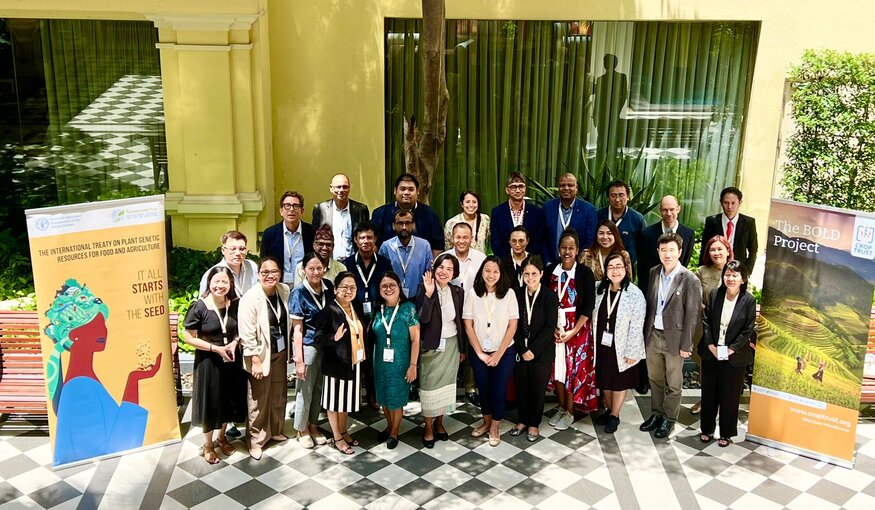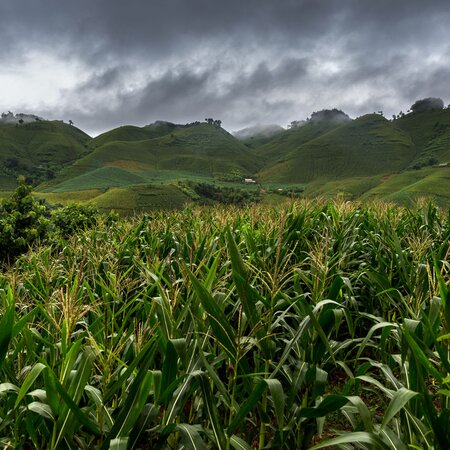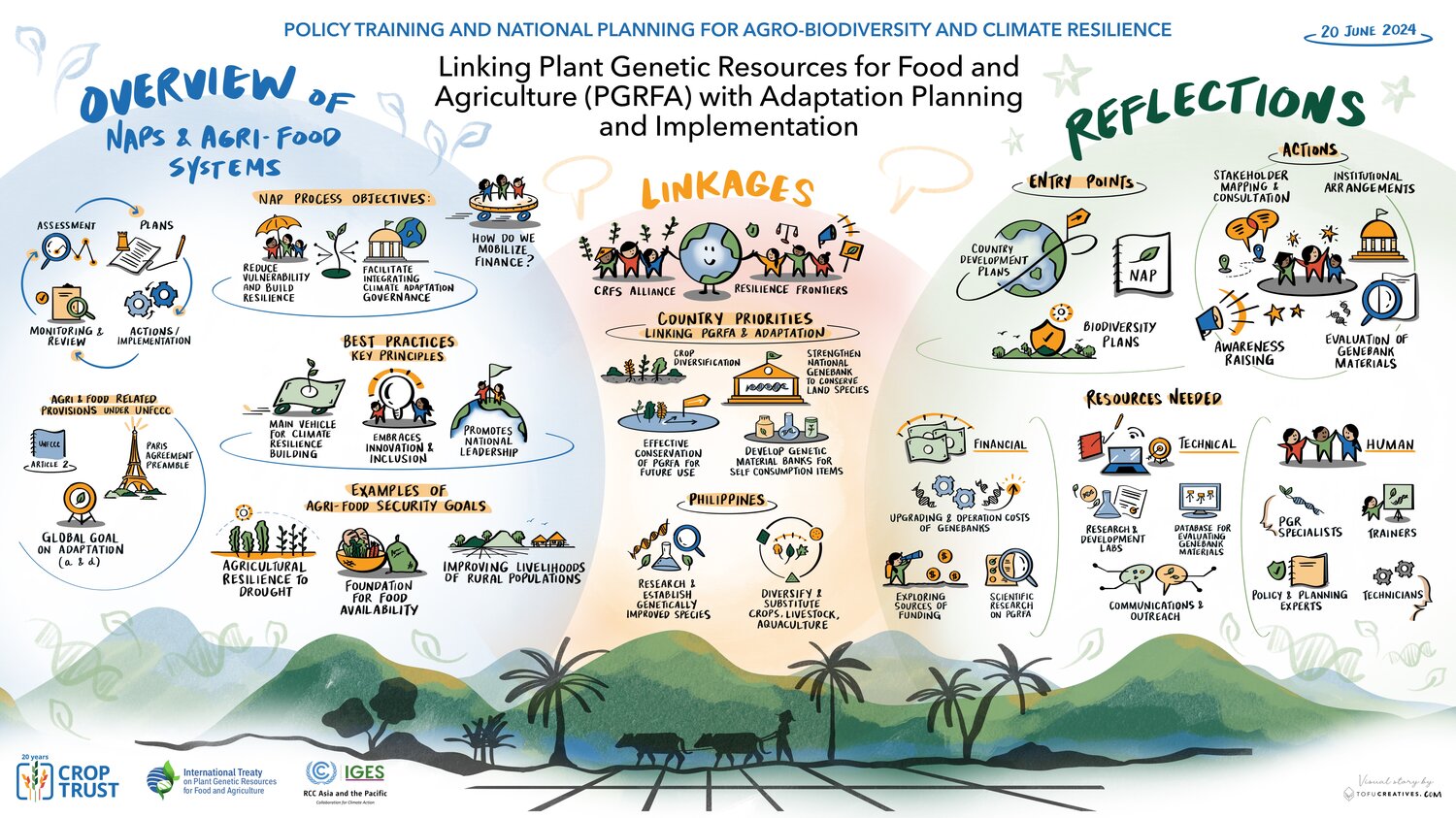Crop Diversity Meets Climate Policy in Bangkok

8 July 2024
Climate and food security policy merged lanes at an international workshop in Bangkok to explore their untapped synergies.
More than 20 participants from Bhutan, Laos, Nepal, Pakistan, Philippines, Thailand and Vietnam attended the 19‒21 June event, which was organized by the International Treaty on Plant Genetic Resources for Food and Agriculture (International Plant Treaty), the Crop Trust, and the Secretariat of the United Nations Convention on Climate Change (UNFCCC), through its regional collaboration center (RCC) for Asia and the Pacific.
The three-day workshop in Thailand took place within the framework of the Biodiversity for Opportunities, Livelihoods and Development (BOLD) Project, which is funded by the Government of Norway and led by the Crop Trust in partnership with the Norwegian University of Life Sciences (NMBU), the Nordic Genetic Resource Center (NordGen), and the International Plant Treaty.
“Climate change is not confined to just one agency at the national level—it is a cross-cutting issue,” said Motsomi Maletjane, a team leader in the Adaptation Division of the UNFCCC Secretariat in Bonn, Germany. “We are trying to ensure that everyone who needs to be involved at the national level is included. Hopefully, this also creates an opportunity for genebanks to contribute.”
Three Sessions
The BOLD workshop brought together genebank managers and representatives from the agriculture, environment, and climate change sectors to learn about the policy aspects of crop diversity conservation and use and how these interface with climate adaptation plans.
Training sessions introduced participants to the national legal and institutional frameworks of biodiversity access and benefit sharing, and to the opportunities arising from the adoption of the Kunming-Montreal Global Biodiversity Framework (KM-GBF) to integrate genebank activities related to plant genetic resources for food and agriculture (PGRFA)—such as conservation, sustainable use, access and benefit sharing—into revised and updated national biodiversity strategies and action plans (NBSAPs).
Participants also learned about the Biodiversity Finance Plans (BIOFIN)—a global programme managed by the United Nations Development Programme—and their links with the NBSAPs.
National Adaptation Plans (NAPs), established by the UNFCCC in 2010, were the focus of the third session, where participants agreed that the work of genebanks must be integrated into regional and national strategies to align climate adaptation efforts with food system resilience and biodiversity conservation.
Of the 56 NAPs1 submitted to the UNFCCC secretariat, agriculture and food security is top priority. Examples of the application of plant genetic resources in food and agriculture are seen in adaptation priorities identified by countries in their NAPs.
Paul Ezekiel Losaria, a development management officer at the Climate Change Commission, presented the Philippines' NAP, which already recognizes food security and crop diversity in its plan.
Why Genebanks?
So, what do genebanks have to do with climate change policy?
The future of food depends on our ability to adapt to climate change, and we cannot do that without the crop diversity held in genebanks.
Without the raw materials to breed new crop varieties that can withstand the growing threats of droughts, floods, plant diseases and pests, humanity will be unable to live with the effects of a warming planet.
Crop diversity makes climate change adaptation possible. But this genetic diversity is rapidly disappearing both in farmers’ fields and in the wild.
Twenty years after the International Plant Treaty entered into force—on 29 June 2004—crop diversity remains an essential pillar of global efforts to safeguard the future of food.
Genebanks play a vital role in this process by serving as repositories of diverse genetic material that allows scientists and plant breeders to develop and make available new crop varieties that are resilient to climate change.
Yet these invaluable collections are often neglected in national adaptation plans. By integrating genebanks into these plans, countries can ensure their food and agricultural strategies stand on solid ground, according to the workshop organizers.
International Agenda
The global community has long recognized the importance of conserving crop diversity, not only through the International Plant Treaty, but also the UN Sustainable Development Goal 2.5 and the Paris Agreement adopted at the UN Climate Change Conference (COP21) in 2015.
Specific goals for crop diversity conservation are also stipulated in the Convention on Biological Diversity (CBD)’s Strategic Plan 2011-2020, including the Aichi Biodiversity Targets, and in the Kunming-Montreal Global Biodiversity Framework, adopted at the 15th meeting of the Conference of Parties (COP-15) of the CBD, December 2022.
Parties to the CBD must submit national biodiversity strategies and action plans (NBSAPs) by COP-16, in October 2024. A national strategy reflects how the country intends to fulfill the objectives of the CBD in light of specific national circumstances, and the related action plans constitute the steps to be taken to meet these goals.
“Why did we need to bring you together for this particular forum?” asked Julie Amoroso-Garbin, regional lead at the UNFCCC RCC Asia-Pacific. “There is value in talking to each other and coordinating efforts at the national level. As you have learned, there are linkages that can be harnessed to implement the NBSAPs and the adaptation priorities identified in the NAPs. You don’t need to start from scratch.”
The BOLD workshop helped national genebank managers navigate the complexity of the different rules and institutions at the interface of food security, climate change, and biodiversity conservation. At the same time, other government officials from the same countries gained a greater awareness about the importance of conserving crop diversity as part of national adaptation plans.
“This ground-breaking event was a significant step in the process of embedding genebanks into the climate policy agenda in Asia,” said Nelissa Jamora, an agricultural economist and project manager at the Crop Trust. “Participants were able to forge meaningful partnerships to help them achieve shared goals on climate change adaptation, food and nutrition security, and biodiversity conservation. It was a win-win-win.”
Categories: For Partners, For Policymakers, BOLD


